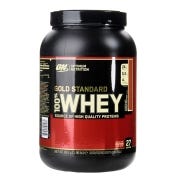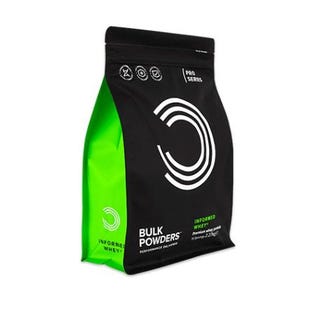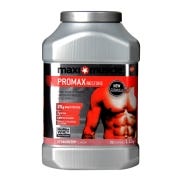How Much Protein Should You Intake to Build Muscle
Let's face it, protein and muscle-building go hand-in-hand. The macronutrient is vital for muscle tissue repair and is full of amino acids: the building blocks of strength. But, with sources, calculations and advice varying wildly, few men actually know how much protein they need to maintain muscle and to keep building bulk.
And without that knowledge the caricature of the gym bro guzzling a protein shake that's surgically attached to him is allowed to live on. Well, no more. We're here to tell you exactly how much protein you need in your diet to build muscle, as well as explain how you can calculate a protein intake that's personalised to you and the foods you can add to your diet to up your protein numbers, if that's necessary.
According to the NHS, the daily reference intake of protein is 50g, but that doesn't take into account the differences between people, so it doesn't change whether you're 6 ft 9 or 4 ft 4, nor does it allow for the difference in need between someone who weighs 80 kilos compared with someone who weighs 200 kilos. But there are ways to work out how much protein you need. And all you have to do is keep reading to find out how.

SUBSCRIBE
What Protein Is and Why It's Important
Before we work out how much protein you need, let's first break down exactly what it is. Put simply, protein is a macronutrient (a nutrient that we need in larger quantities) that is built from amino acids, which are stitched together into long chains. Some of these chains your body can make naturally – known as 'non-essential' – and some of which it can't. These are called 'essential' amino acids and you need to source them from food. When you chow down on a chicken breast your body breaks proteins down into their constituent amino acids, which it then uses to build everything from new muscle to organs and hair.
Why Protein Is Important for Building Muscle
To build muscle, your body needs to synthesise more muscle protein than it breaks down, which is why anyone looking to build muscle needs to make sure they're getting enough protein, as well as making sure the work they're doing in the weights room is right too.
It's not just us saying that, there's a body of research that confirms the part protein plays in building muscle. A study published in the journal Nutrients, for example, found that "protein intake was shown to promote additional gains in lean body mass beyond those observed with resistance exercise alone."

THE Whey™
Myprotein myprotein.com
£34.99

Gold Standard 100% Whey
Optimum Nutrition hollandandbarrett.com
£24.00

Informed Whey
Bulk Powders bulkpowders.co.uk
£53.99

Promax Powder Strawberry
Maximuscle hollandandbarrett.com
£19.99
Why Protein Is Important for Weight Loss
As well as being good for building strength, protein also plays an important role in losing weight. Evidence suggests that eating protein can both increase the number of calories you burn, by stimulating your metabolic rate, as well as reduce your appetite, meaning you're less likely to put on pounds in the first place. What's more, a study by researchers at Maastricht University reported that even a modest increase in protein, from 15% to 18% of calories, reduced the amount of fat people regained after weight loss by 50%.
Are You Getting Enough Protein?
So the current daily reference intake of protein is 50g, while the recommended dietary allowance suggests that you should eat a modest 0.8g of protein daily per kg of bodyweight. If you're not already aware, let us be the first to tell you: that's not enough to really pack on muscle.
"Elite athletes eat around 2g per kg every day," says Dr Karen Reid, a sports science nutritionist who's worked with the Wales rugby team, and the founder of Performance Food. She recommends getting near that level for the first 12 weeks of a new workout programme. "That's when you're sore, when you're breaking down muscle fibres and creating new structures." And damage plus fuel equals growth. After 12 weeks, she recommends scaling back to between 1.2g and 1.6g per kilo.
This content is imported from YouTube. You may be able to find the same content in another format, or you may be able to find more information, at their web site.
Why You Shouldn't Calculate How Much Protein You Need Based on Total Calories or Weight
On a simple level, protein guidelines generally fall into one of two camps: a proportion either of how much you eat or how much you weigh. However, both are flawed if you're looking to build muscle fast.
Take only eating a specific percentage of protein. The problem is that the numbers are going to be affected in a big way by your total calorie intake. For example, 30 per cent protein on a 2000-calorie diet (600 calories) is very different from 30 per cent protein on a 4000-calorie diet (1200 calories) despite the fact that the percentages are exactly the same: 150g a day compared to 300g a day.
So, calculating your protein intake relative to your weight could be better, as it stays consistent regardless of how many calories you're packing in.
For example, if you were to eat two grams of protein per kilo of bodyweight, you'll be fuelling yourself with the same amount of protein regardless of your total daily calorie count — whether that's 1500 or 4000. However, this system is also not without its flaws.
This content is imported from {embed-name}. You may be able to find the same content in another format, or you may be able to find more information, at their web site.
How to Actually Calculate Your Protein Needs
Perhaps, then, the best way to measure how much protein you need to consume daily is based on lean body mass, or everything in your body that isn't fat. This could provide a more accurate figure than focusing on just your total weight.
Of course, if you're a fitness model sitting comfortably at four per cent body fat, then there's obviously not going to be much difference whether protein intake is expressed relative to your weight or lean body mass. For the average guy, however, it's a considerably different story. They're likely to be carrying more weight around their midriff and have a higher body-fat percentage.
On the flipside, let's look at an obese man who weighs 135kg. In this case, it would be unwise to base his protein intake on his total bodyweight. Using the 2g of protein per kg, he'll be eating a whopping 270g protein on a daily basis.
Needless to say, our hypothetical overweight man definitely doesn't need to be eating the equivalent of 10 chicken breasts a day, even if he's looking to build muscle. In fact, most research shows little benefit to consuming more than 2.2g of protein per kg of lean body mass.
If you weigh 90kg with 20 per cent body fat, you have 72kg of lean body mass. Multiply that number by 2.2, and you get a daily protein target of 158g per day. If you weigh 90 kilograms with 10 per cent body fat, you have 81 kilograms of lean body mass. Multiply that by 2.2, and you get 178 grams of protein per day. Far more realistically achieved by upping your steak and eggs intake.
This content is imported from YouTube. You may be able to find the same content in another format, or you may be able to find more information, at their web site.
So, How Much Protein Do You Need?
For any guy who's cut his teeth on the gym floor and with several years of training behind them could theoretically get away with less daily protein. That's because, the closer you are to your genetic limit in terms of muscle growth, the slower the gains will come. And the slower your rate of growth, the less protein you need to support that growth. Understood?
In short, if you're trying to gain muscle, or even if you just want to hold on to the muscle you have while you drop fat, 2.2g of protein per kg of lean body mass is plenty.
You can eat more if you like. However, bear in mind that it's not going to make much difference to the speed at which you gain muscle and will make a difference not only to your bank balance, but potentially your waistline too.
Best High-Protein Foods for Building Muscle
Need to up your protein intake? Look no further than the following foods.
- Chicken Breast: 33g of protein per 100g
- Cod: 18g of protein per 100g
- Whey Protein: 80 to 90g of protein per 100g
- Vegan Protein: 70 to 80g of protein per 100g
- Clams and Other Molluscs: 48g of protein per 100g
- Low-sodium Parmesan Cheese: 42g of protein per 100g
- Tofu: 17g of protein per 100g
- Lean Beef: 36g of protein per 100g
- Lamb: 25g of protein per 100g
- Pork Tenderloin: 23g of protein per 100g
- Soya Protein Isolate: 88g of protein per 100g
- Eggs: 12.5g of protein per 100g
- Grilled Salmon: 24.2g of protein per 100g
- Tuna: 23g of protein per 100g
- Grilled pork chop: 31g per 100g
When to Eat Protein
Timing your protein hits is vital to optimise your gains. Your body can't process more than 25 to 35g of protein per serving, so scoffing six steaks at dinner is a waste. "It's not about having shedloads all at once," say Reid. And anyway, your most important protein hit is the one after your gym session.
"You want that immediate stimulus," says Reid. "Within the 30-minute window post-workout you're looking to optimise the repair and regeneration process." That's when you want rapidly-absorbed whey protein, either by chugging a shake or a pint of milk. Reid also recommends a skinny latte for a pre-gym boost: "You've got the caffeine kick, the protein in the milk and if you try a banana with it, a bit of carbohydrate." Pairing your protein with carbs is good sense. After exercise your body produces the stress hormones adrenaline and cortisol, which break down proteins, fats and sugars. When they're coursing through you, you're not building muscle. "When you get some recovery nutrition in it counters those stress hormones," says Reid, switching your body back into repair mode and kickstarting growth.
Are You Eating Too Much Protein?
While we want you to get enough protein in you diet, you can also have too much of a good thing, and if you eat too much protein, you may be doing more harm than good. People that eat very high protein diets have a higher risk of kidney stones, while a high protein diet that contains lots of red meat and higher amounts of saturated fat has been linked to a higher risk of heart disease and colon cancer.
Sign up to the Men's Health newsletter and kickstart your home body plan. Make positive steps to become healthier and mentally strong with all the best fitness, muscle-building and nutrition advice delivered to your inbox.
SIGN UP
Love what you're reading? Join our goal-smashing membership today from only £5, cancel anytime. You belong in the Men's Health SQUAD!
FIND OUT MORE
This content is created and maintained by a third party, and imported onto this page to help users provide their email addresses. You may be able to find more information about this and similar content at piano.io
How Much Protein Should You Intake to Build Muscle
Source: https://www.menshealth.com/uk/nutrition/a754243/how-much-protein-should-i-eat-to-build-muscle/